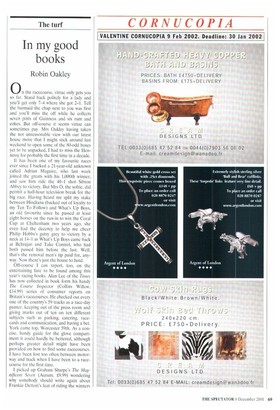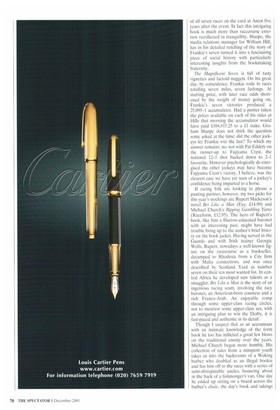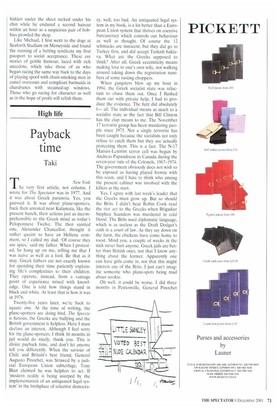In my good books
Robin Oakley
On the racecourse, virtue only gets you so far. Stand back politely for a lady and you'll get only 7-4 where she got 2-1. Tell the barmaid the chap next to you was first and you'll miss the off while he collects seven pints of Guinness and six rum and cokes. But off-course it seems virtue can sometimes pay. Mrs Oakley having taken the not unreasonable view with our latest house move that I might stick around last weekend to open some of the 80-odd boxes yet to be unpacked, I had to miss the Hennessy for probably the first time in a decade.
It has been one of my favourite races ever since I backed a 21-year-old unknown called Adrian Maguire, who last week joined the greats with his 1,000th winner, and saw him ride the 40-1 shot Sibton Abbey to victory. But Mrs 0, the softie. did permit a half-hour television break for the big race. Having heard me split my stake between Hindiana (backed out of loyalty to my Ten To Follow) and What's Up Boys, an old favourite since he passed at least eight horses on the run-in to win the Coral Cup at Cheltenham two years ago, she even had the decency to help me cheer Philip Hobbs's gutsy grey to victory by a neck at 14-1 as What's Up Boys came back at Behrajan and Take Control, who had both passed him before the last. Well, that's the removal men's tip paid for, anyway. Now there's just the house to fund.
Off-course I can report, too, on the entertaining fare to be found among this year's racing hooks. Alan Lee of the Times has now collected in book form his handy The Course Inspector (Collins Willow, £14.99) series of consumer reports on Britain's racecourses. He checked out every one of the country's 59 tracks as a race-day punter, keeping out of the press room and giving marks out of ten on ten different subjects such as parking, catering, racecards and communication, and having a bet. York came top, Worcester 59th. As a concise. handy guide for the glove compartment it could hardly be bettered, although perhaps greater detail might have been provided on how to find some racecourses. I have been lost too often between motorway and track when I have been to a racecourse for the first time.
I picked up Graham Sharpe's The Magnificent Seven (Aurum, £9.99) wondering why somebody should write again about Frankie Dettori's feat of riding the winners
of all seven races on the card at Ascot five years after the event. In fact this intriguing book is much more than racecourse emotion recollected in tranquillity. Sharpe, the media relations manager for William Hill, has in his detailed retelling of the story of Frankie's seven turned it into a fascinating piece of social history with particularly interesting insights from the bookmaking fraternity.
The Magnificent Seven is full of tasty vignettes and factoid nuggets. On his great day, by coincidence, Frankie rode in races totalling seven miles, seven furlongs. At starting price, with later race odds shortened by the weight of money going on, Frankie's seven victories produced a 25,095-1 accumulator. Had a punter taken the prices available on each of his rides at Hills that morning the accumulator would have paid £104,815.25 to a £1 stake. Graham Sharpe does not shirk the question some asked at the time: did the other jockeys let Frankie win the last? To which my answer remains: no, not with Pat Eddery on the runner-up to Fujiyama Crest, the notional 12-1 shot backed down to 2-1 favourite. However psychologically de-energised the other jockeys may have become Fujiyama Crest's victory. I believe, was the clearest case we have yet seen of a jockey's confidence being imparted to a horse.
If racing folk are looking to please a punting partner, however, my two picks for this year's stockings are Rupert Mackeson's novel Bet Like a Man (Eye, £14.99) and Michael Church's Ripping Gambling Yarns (Raceform, 1.12.95). The hero of Rupert's book, like him a Harrow-educated baronet with an interesting past, might have had trouble living up to the author's brief history on the book jacket. Having served in the Guards and with Irish trainer Georgie Wells, Rupert, nowadays a well-known figure on the racecourse as a bookseller, decamped to Rhodesia from a City firm with Mafia connections, and was once described by Scotland Yard as number seven on their ten most wanted list. In central Africa he developed new talents as a smuggler. Bet Like a Man is the story of an ingenious racing scam, involving the racy baronet, an American-born countess and a rich Franco-Arab. An enjoyable romp through some upper-class racing circles, not to mention some upper-class sex, with an intriguing plan to win the Derby, it is fast-paced and authentic in its detail.
Though I suspect that as an accountant with an intimate knowledge of the form book he too has inflicted a good few blows on the traditional enemy over the years, Michael Church began more humbly. His collection of tales from a misspent youth takes us into the backrooms of a Woking barber who doubled as an illegal bookie and has him off to the races with a series of semi-disreputable uncles, bouncing about in the back of a fishmonger's van. One day he ended up sitting on a board across the barber's chair, the day's book and takings hidden under the sheet tucked under his chin while he endured a second haircut within an hour as a suspicious pair of bobbies prowled the shop.
Like Michael, I first went to the dogs at Seaforth Stadium on Merseyside and found the running of a betting syndicate my first passport to social acceptance. These are stories of gentle humour, laced with rich anecdote, which take those of us who began racing the same way back to the days of playing spoof with chain-smoking men in camel overcoats and compliant barmaids in charabancs with steamed-up windows. Those who go racing for character as well as in the hope of profit will relish them.
























































































 Previous page
Previous page